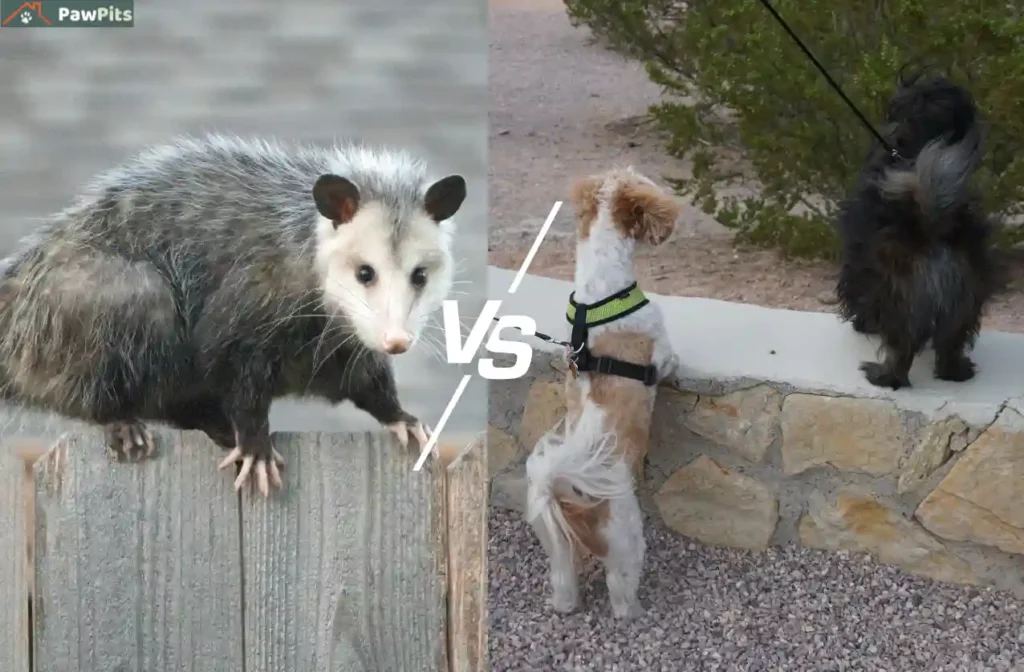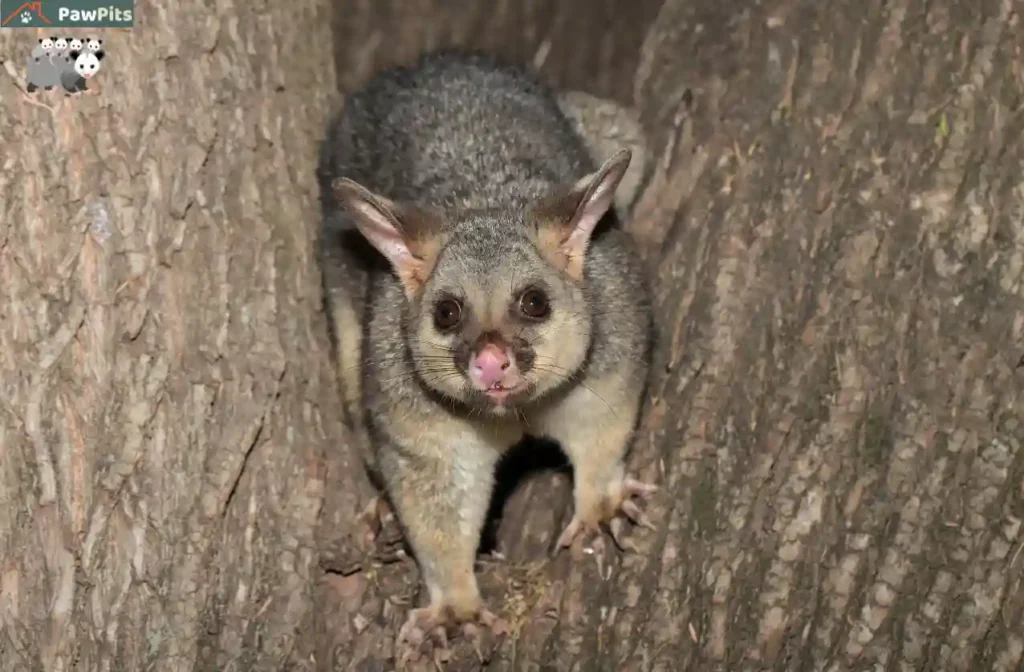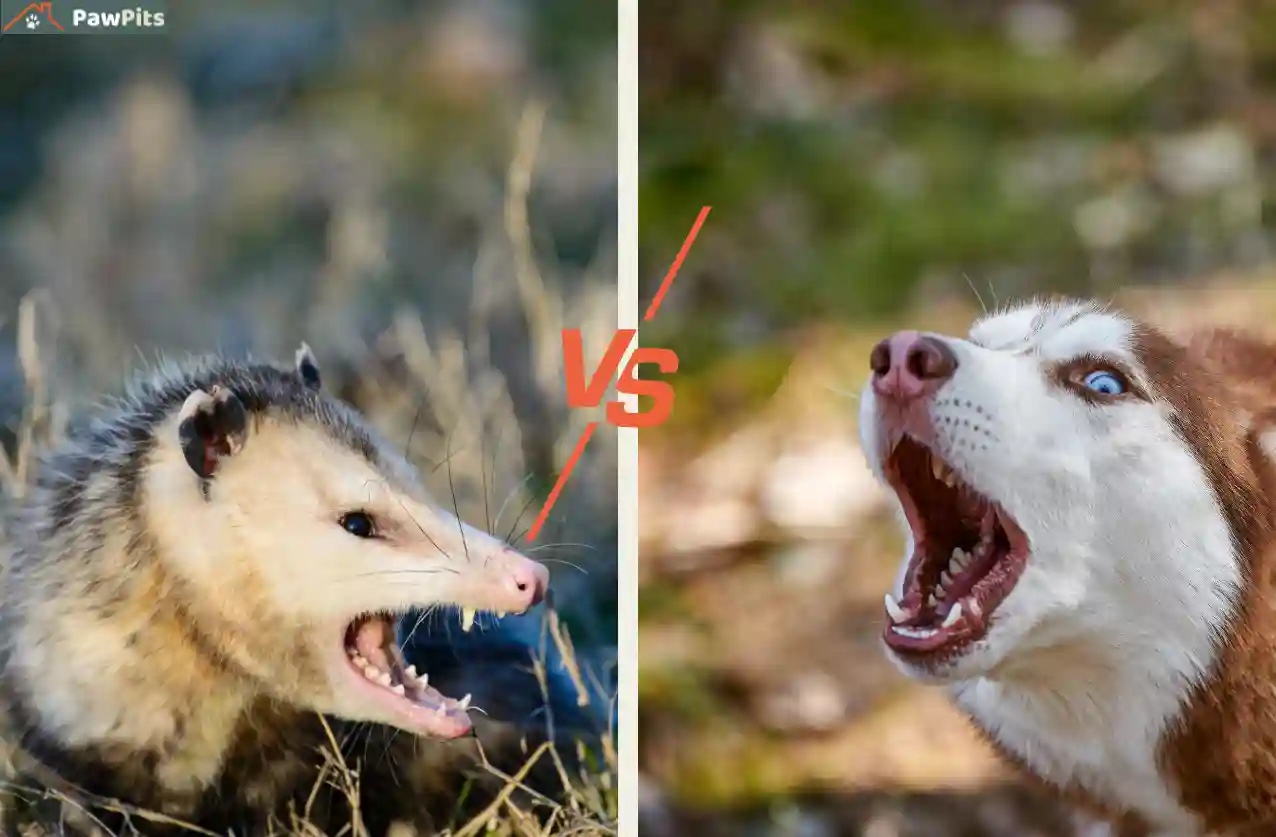So here’s the thing , if you’ve ever seen your dog lose its mind at 2 a.m. because something rustled near the trash bins, you already know the sinking feeling: What if it’s a possum? And wait… are possums dangerous for dogs?
I wish the answer were as simple as “yes” or “no.” But it isn’t. Possums aren’t out there plotting attacks on pets , most of the time, they just want to be left alone. If cornered, sure, they might hiss or scratch. But the bigger issue? They can carry fleas, ticks, and sometimes diseases you don’t see coming until your dog gets sick. That’s the part people forget.
And honestly, the internet doesn’t help. One article swears possums are harmless little tick vacuums that should be welcomed; another warns they’re disease bombs on four legs. Somewhere in between lies the truth , and that’s what I want to unpack here without the hype.
Here’s what we’ll cover:
- How possums actually behave around dogs (spoiler: they’re more scared than scary).
- The real dangers , like parasites and infections , versus the “sounds bad but is rare” stuff.
- What you can do to keep your dog safe without stressing every time a possum waddles across your fence.
I’m not here to make you paranoid or sugarcoat it. I’m here to lay out the risks in plain English, sprinkle in some common sense, and leave you feeling like, “Okay, I know what’s worth worrying about , and what isn’t.”

How Likely is Danger? The Big Picture
Okay, let’s be real for a second. When people ask, “Are possums dangerous to dogs?” what they really want to know is: Am I overreacting, or do I actually need to worry?
Here’s the not-so-glamorous truth: possums aren’t prowling the neighborhood plotting dog attacks. They’re basically shy scavengers , more interested in raiding your trash can than squaring up with a Labrador. Most of the time, if your dog charges, the possum will either hiss (kind of a creepy sound, honestly), freeze, or flop into their Oscar-winning “I’m totally dead, don’t eat me” act.
So, direct attacks? Rare. Like, really rare. But that doesn’t mean you should shrug and say, “No problem.” The sneaky part is the indirect stuff:
- The easy-to-happen annoyances: fleas, ticks, mites. Not life-or-death, but if your dog brings them inside? Nightmare.
- The not-super-common but possible stuff: scratches or bites if your dog corners one. Painful, maybe infected, but fixable.
- The “please don’t let this happen” stuff: diseases like leptospirosis. Rare, but nasty if your dog catches it.
See the pattern? The everyday risks aren’t usually dramatic , but the rare ones can be severe. That’s why it feels confusing. People either downplay possums as “cute, harmless trash pandas” or demonize them as rabies carriers. Reality? They’re somewhere in the messy middle.
Now, does this mean your dog is automatically in danger the second a possum steps into the yard? Nope. A lot depends on the setup:
- A food-motivated terrier left outside at night? More likely.
- A calm, supervised dog in a fenced yard? Much less likely.
In other words, possum danger isn’t a yes-or-no question. It’s more of a “depends on your dog, your yard, and your luck” kind of deal.
FAQ: Could a possum actually kill my dog?
Almost certainly not. Unless you’ve got a tiny puppy and a really aggressive possum (which is… rare), your dog is way more dangerous to the possum than the other way around. The bigger worry is scratches, bites, or diseases your dog could pick up along the way.
What Risks Do Possums Pose to Dogs?
When people think “danger,” they usually picture a dramatic fight in the backyard , teeth, claws, the works. But honestly, that’s not the most common risk with possums. The trouble comes in different forms, and each one matters for a different reason. Let’s break it down.
1. Physical Injuries: Scratches and Bites
Possums aren’t natural fighters, but if cornered, they can lash out with sharp claws or teeth. Most dogs , especially bigger ones , will come out of that scuffle with the upper hand. Still, even a small scratch or puncture wound can spiral into an infection if bacteria get in. That’s why vets always say: check your dog thoroughly after a wildlife encounter, even if the injury looks tiny.
2. Disease Transmission
Here’s where things get murkier. Possums can carry or spread several diseases, though the likelihood varies:
- Leptospirosis: Probably the most important one for dog owners. Spread through possum urine contaminating soil or water. If your dog drinks from puddles where a possum’s been, there’s a risk. Symptoms can range from fever to kidney failure , not something to shrug off.
- Rabies: Almost always brought up, but here’s the nuance: possums rarely carry rabies because their body temperature is too low for the virus to thrive. Rare doesn’t mean impossible, but your dog’s odds of catching rabies from a possum are slim.
- Other infections: Salmonella, coccidiosis, even tuberculosis are sometimes linked to possums. These are far less common but get mentioned because they exist in the scientific record.
3. Parasites: The Silent Hitchhikers
Even if the possum never touches your dog, they can leave behind unwanted guests:
- Fleas and ticks: Possums are basically free Uber rides for these pests.
- Mites and lice: Less common, but still a headache.
- Roundworms and other intestinal nasties: If your dog sniffs or eats possum droppings (gross, but dogs do it), parasites can transfer.
This category doesn’t sound dramatic, but anyone who’s dealt with a flea infestation knows it can turn your home upside down.
4. Indirect Risks
Sometimes the possum isn’t the real problem , it’s what they leave behind: urine, feces, or contaminated water. Dogs that like to dig or drink from outdoor puddles are more likely to pick up something this way than from a direct fight.
FAQ: Which risk is the most serious for dogs?
Leptospirosis stands out. It’s not the most common, but it’s the one vets worry about most because of how severe it can get if untreated. Fleas and ticks are more likely but usually less life-threatening. The “right answer” is both matter , just on different levels.
Real-Life Encounters Between Dogs and Possums
Sometimes it’s easier to understand the risks when you hear what actually happened to other dogs. I’ve seen plenty of stories pop up in vet forums and pet groups , and they paint a clearer picture than stats alone.
Case Example 1: The Backyard Standoff
One Golden Retriever owner in Texas shared how their pup cornered a possum by the fence. The possum froze, hissed a little, and eventually scurried off. No injuries, no blood. But the next day? The dog was scratching nonstop. A vet visit confirmed fleas , likely picked up during that short encounter. Not life-threatening, just messy, stressful, and pricey to fix.
Case Example 2: The Scratch That Got Ugly
A small terrier in Florida actually did get nipped while chasing a possum. The wound looked minor at first, almost like a scratch from brambles. Two days later the paw swelled up and the dog was limping. Turned out it was a bacterial infection that needed antibiotics. The owner admitted they almost ignored it, which could’ve made things much worse.
Case Example 3: The Contaminated Bowl
Here’s the sneaky one: a dog in California got leptospirosis after drinking from a backyard water dish possums had been using too. No fight, no scratches , just urine contamination. The dog ended up hospitalized with kidney trouble but thankfully recovered after treatment. That’s the danger most people never think about.
Why These Stories Stick
The takeaway isn’t “panic every time you see a possum.” Most encounters end without drama. But these cases show how easily a small thing , a sip of water, a tiny scratch , can snowball if overlooked.
FAQ: Do I need a vet visit after every possum sighting?
Not if there was no contact. A possum strolling across your yard isn’t an emergency. But if your dog was scratched, bitten, or even drank from a spot possums might’ve contaminated, it’s worth calling the vet just to be safe.
When to Be Especially Vigilant
Here’s the thing: not every dog is in danger just because a possum wanders through the yard. For a lot of people, it’s a non-event. But there are situations where I’d personally pay closer attention.
Take certain breeds, for example. If you’ve got a terrier or a herding dog , basically any pup with a built-in “must chase it” button , the odds of a possum encounter getting messy shoot way up. On the flip side, a sleepy old bulldog might just watch a possum shuffle by without moving a muscle. Size matters too. Smaller dogs can get hurt faster, while older dogs or ones with weaker immune systems don’t bounce back as easily from infections.
And then there’s the backyard setup. If you’re leaving food outside , maybe the dog’s kibble bowl, maybe scraps in the trash , you’re basically sending possums a dinner invitation. Same goes for compost piles or uncovered garbage. They’ll come back again and again if they find a food source.
I’ve also noticed it’s worse in certain seasons. After heavy rains, for example, puddles stick around, and that’s when leptospirosis becomes more of a worry. Where I live, possums seem bolder in the summer, maybe because food is easier to find. Point is: your geography and the time of year really change the odds.
If you’re wondering whether you should be on “high alert,” here are a few quick red flags I’d watch for:
- Your dog comes inside after dark smelling gross or looking like they’ve rolled in something.
- You hear barking at the fence line more often at night.
- Mysterious scratches on your pup , even tiny ones.
- Or, the obvious one: you’ve actually seen a possum hanging out near your trash or water bowls.
FAQ: How do I even know if possums are around?
Besides spotting them, you’ll usually know by the mess. Knocked-over trash cans, weird droppings in the yard, and sometimes that unmistakable hiss they make if you surprise them. If you really want proof, a cheap motion-sensor camera will settle the debate fast.

Practical Prevention Measures
Alright, so knowing the risks is one thing , but what do you actually do about it? The good news: you don’t need a fortress around your house to keep your dog safe. A few small habits can make a huge difference.
Clean Up the Buffet
Possums go where the food is. If you’re leaving dog food outside, or your trash can lid is loose, you’re basically rolling out the red carpet. Bring bowls inside after feeding and make sure garbage cans actually stay closed. I’ve seen people swear by bungee cords over lids , cheap and it works.
Yard Check 101
Walk your yard once in a while, especially in the evening. Look for possum droppings, standing water, or signs of digging. If you spot anything suspicious, clean it up before your dog does their usual “let me sniff that” routine.
Train the Basics
Commands like “leave it” or “come” sound boring until you realize they can stop your dog from lunging at a possum. It doesn’t have to be military-grade obedience , just enough that your dog listens when it counts.
Health Prep Matters
This part isn’t glamorous, but it’s the safety net: keep your dog up-to-date on vaccines (leptospirosis if it’s common in your area) and flea/tick prevention. That way, even if contact happens, you’ve already cut the risk way down.
What If They Do Meet a Possum?
Don’t panic, but don’t shrug it off either. Check your dog over for scratches or bites. Wash any wounds with mild soap and water, then call your vet if you see swelling, limping, or anything unusual. And if your dog actually drank from a contaminated water bowl or puddle? Yeah, that’s a “better safe than sorry” vet visit.
FAQ: Should I try to trap or kill possums to keep my dog safe?
Honestly? No. Possums aren’t villains , they eat ticks, snakes, even rotting garbage. Trapping or killing usually just creates more problems (and in many places, it’s illegal). It’s smarter to “dog-proof” your space than to wage war on the possums.
The Surprising Benefits of Possums
Alright, I know this whole piece has been about the risks of possums, but here’s the twist: they’re not just backyard villains. Honestly, they’re kind of underrated.
For starters, possums are like nature’s little vacuum cleaners. They eat ticks , a lot of them. Some wildlife folks claim a single possum can munch through thousands of ticks in one season. And let’s be honest, anything that cuts down on ticks is a win for our dogs (and us).
They’re also scavengers, which sounds gross, but it’s useful. Dead stuff on the road? Fallen fruit in the yard? Possums clean it up. They’ll even take care of some snakes. Not exactly glamorous work, but someone’s gotta do it.
And here’s the part most people get wrong: rabies. Possums almost never carry it. Their body temp is too low for the virus to stick around. Compare that to raccoons or bats, and suddenly possums don’t look so scary.
So yeah, they can spread parasites or contaminate water bowls , no sugarcoating that. But they’re also keeping other pests in check. If you wiped every possum out of your neighborhood, you might actually end up with more problems, not fewer.
FAQ: Does that mean I should be “pro-possum”?
Not exactly. You still don’t want them getting cozy with your dog’s food or water. But if one waddles across your fence line at night and isn’t bothering anyone? Sometimes the best move is just… let it do its thing and move on.
Conclusion
So here’s where I land on the whole “are possums dangerous to dogs” thing: kinda, sorta, sometimes. They’re not out there plotting dog ambushes , most of them just want to waddle past your fence and be left alone. But ignoring them completely? That’s how you miss the sneaky stuff, like fleas, ticks, or that random puddle your dog drinks from that turns into a vet bill later.
What I’ve learned is it’s less about the possum itself and more about the setup. If your yard’s basically an all-you-can-eat buffet, possums will come back. If your dog’s a little too enthusiastic about chasing anything that moves, chances of a tussle go up. But with some simple tweaks , picking up food, keeping shots current, teaching “leave it” , you’ve already handled most of the risk.
And honestly? The longer I’ve watched them, the more I think possums are kind of the weird neighbors you don’t exactly like but also don’t want to get rid of. They’re messy, sure, but they also eat ticks, snakes, even roadkill. They’re not heroes, but they’re not villains either.
So no, don’t panic every time your dog spots one. Just be smart, keep an eye out, and maybe give your pup a pat on the head for being the self-appointed “yard security.” Nine times out of ten, the possum’s already gone by the time you grab a flashlight anyway.


One thing to add, is that possums can also spray somewhat like a skunk does and the smell is absolutely horrible. I came across your story because my dog got sprayed inside my suburban yard about 10 PM last night. If I were going to rate a skunk stick as 10 out of 10, this smell is a seven or eight. Not exactly the same as a skunk but extremely foul and very powerful. You could see yellowish green patches of it on her fur where the smell was most intense. I tried the combined hydrogen peroxide, baking soda and dawn soap recommendation, but that really didn’t do much. What I did find to be a game changer was running over to the pet store and getting some skunk neutralizing spray. My local store carries the Skout brand which I am very happy with, there may be other brands out there that are good as well. It worked on both the dog and the rug that she rubbed herself all over as soon as she came back in. Just wanted to pass this on in case anyone else is here because their dog got sprayed and it’s stinking up the entire house. We also used some of the expensive enzyme treatments for urine in the yard and that is helping knock down the smell in the yard as well. It is a truly powerful and incredibly unpleasant stench.